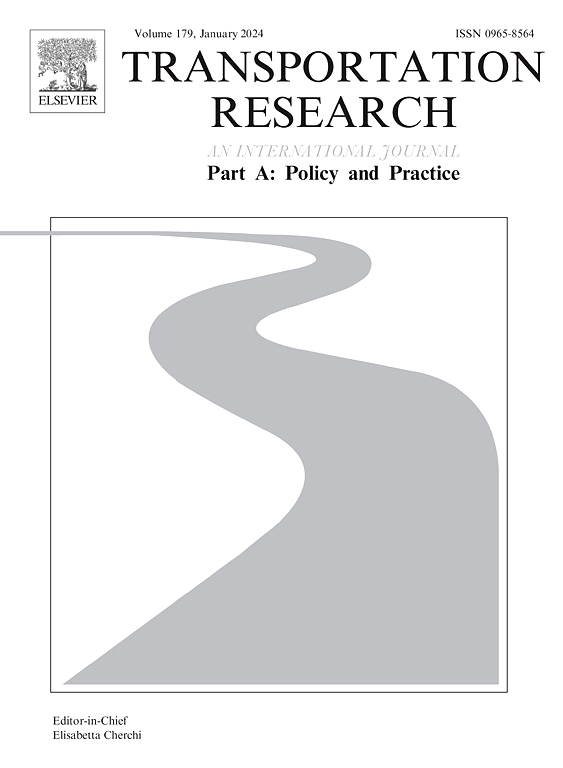Travel decision making under uncertainty and road traffic behavior: The multifold role of ambiguity attitude
IF 6.8
1区 工程技术
Q1 ECONOMICS
Transportation Research Part A-Policy and Practice
Pub Date : 2024-11-26
DOI:10.1016/j.tra.2024.104326
引用次数: 0
Abstract
To connect commuters’ uncertain mode choices with traffic behavior in the presence of travel time variability, we develop a dynamic traffic simulation in terms of an agent-based model, which consists of two sub-models, the mode choice model and the traffic flow simulation model. The modeling framework accommodates the interplay between mode choice and traffic behaviors and their co-evolution over time. We embed an extended list of empirical parameters including ambiguity/risk attitudes and time-money trade-offs within a rank-dependent and mode-dependent utility framework to imitate commuters’ daily mode choice behaviors. The improved behavioral realism at the micro-level results in more realistic outputs such as modal split and average speed at equilibrium. The evidence demonstrates that a richer representation of mode choice behavior at the individual level is associated with a gain in aggregating them to the level of system behavior, in which ambiguity seeking, a typical behavior in the loss domain but largely ignored in the transport literature, plays an important role.
不确定性下的出行决策与道路交通行为:模糊态度的多重作用
为了将通勤者在旅行时间可变情况下的不确定模式选择与交通行为联系起来,我们开发了一种基于代理的动态交通模拟模型,该模型由两个子模型组成,即模式选择模型和交通流模拟模型。该模型框架考虑了模式选择和交通行为之间的相互作用以及它们随时间的共同演变。我们将包括模糊性/风险态度和时间-金钱权衡在内的经验参数扩展列表嵌入等级依赖型和模式依赖型效用框架中,以模仿通勤者的日常模式选择行为。微观层面行为真实性的提高带来了更真实的输出,如均衡时的模式分配和平均速度。证据表明,在个人层面对模式选择行为进行更丰富的表征,与将其汇总到系统行为层面的收益相关联,在系统行为中,模糊性寻求是损失领域的典型行为,但在交通文献中大多被忽视。
本文章由计算机程序翻译,如有差异,请以英文原文为准。
求助全文
约1分钟内获得全文
求助全文
来源期刊
CiteScore
13.20
自引率
7.80%
发文量
257
审稿时长
9.8 months
期刊介绍:
Transportation Research: Part A contains papers of general interest in all passenger and freight transportation modes: policy analysis, formulation and evaluation; planning; interaction with the political, socioeconomic and physical environment; design, management and evaluation of transportation systems. Topics are approached from any discipline or perspective: economics, engineering, sociology, psychology, etc. Case studies, survey and expository papers are included, as are articles which contribute to unification of the field, or to an understanding of the comparative aspects of different systems. Papers which assess the scope for technological innovation within a social or political framework are also published. The journal is international, and places equal emphasis on the problems of industrialized and non-industrialized regions.
Part A''s aims and scope are complementary to Transportation Research Part B: Methodological, Part C: Emerging Technologies and Part D: Transport and Environment. Part E: Logistics and Transportation Review. Part F: Traffic Psychology and Behaviour. The complete set forms the most cohesive and comprehensive reference of current research in transportation science.

 求助内容:
求助内容: 应助结果提醒方式:
应助结果提醒方式:


